We try Keiji, an incredibly rare and expensive one-in-ten-thousand salmon sushi 【Taste test】
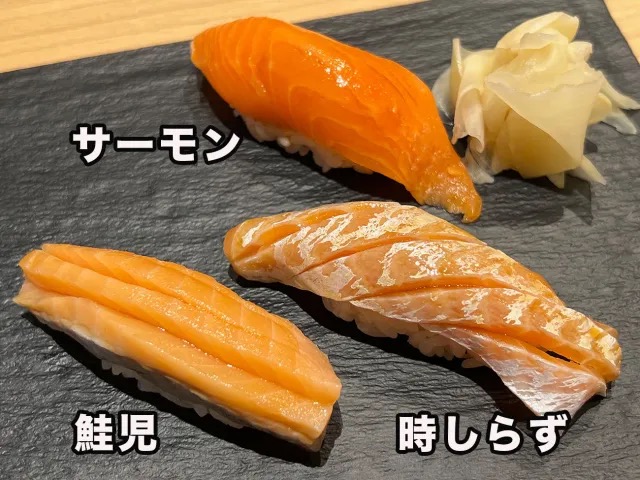
With only one of these caught for every 10,000 salmon, this rare fish comes with a super high price tag.
When it comes to sushi, salmon is one of the most popular choices on the menu, but did you know there’s an uber-rare expensive type of salmon sushi called keiji?
Dubbed a “phantom fish” due to its rarity, only around one keiji can be caught for every 10,000 salmon, leading it to be traded as a super-luxury fish. Usually, this type of fish only appears up in Hokkaido, so it’s rare to find it on the mainland, and if you are fortunate enough to find it, you can expect to pay over ten times more for it than you would an ordinary salmon.
So when our reporter Yuuichiro Wasai saw it on the menu at a newly opened restaurant in Tokyo Station called 57 Tokyo, he immediately ordered it, despite the high price tag.
▼ 57 Tokyo, which opened on 4 August, goes by the full name Sapporo Uogashi 57 Sushi, and is run by Hokkaido-based Sapporo Seafoods.
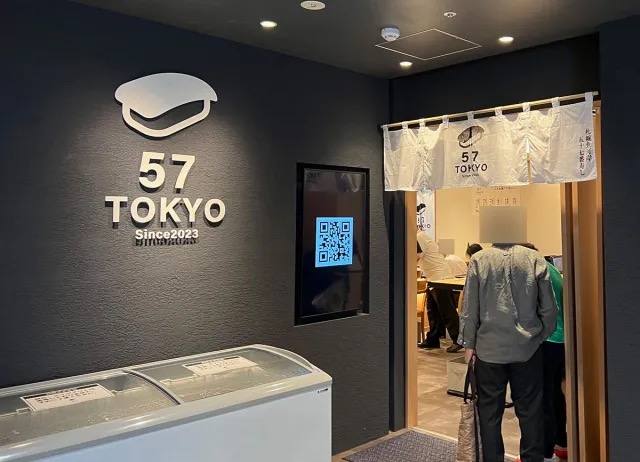
At first, Yuuichiro almost missed it when he looked at the menu, given that he was ready to just hit the button for regular salmon, as he usually does when visiting sushi restaurants. However, he managed to spot the characters 鮭児 (“Keiji“) beneath the sushi underneath it, which caught his attention, because it means “young salmon”.
This piqued his interest as he remembered reading about Keiji a while back. Apparently, these are young, two-to-three-year-old salmon that are born in Russian rivers and somehow get mixed up with older four-year-old salmon that return to Japan to spawn.
Keiji is an elusive type of salmon that sushi lovers dream of trying, so Yuuichiro ordered it, along with a regular salmon and a Tokishirazu salmon.
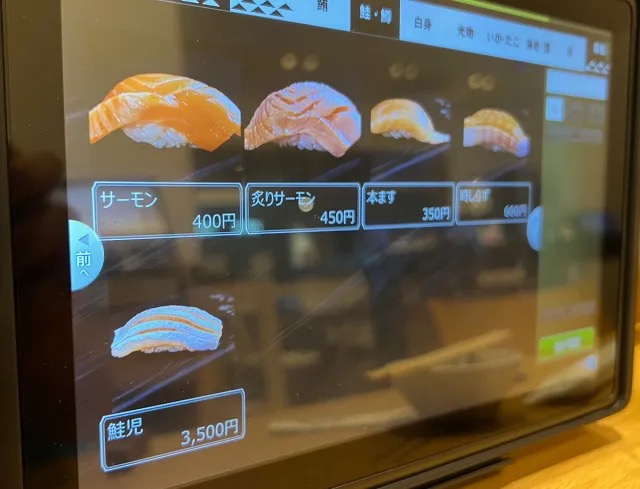
One piece of Keiji cost 3,500 yen (US$24.07), compared to 400 yen for one regular salmon and 600 yen for one Tokishirazu, so he was interested to compare them. When the platter arrived, he could instantly see that the Keiji (left, below) was a lot paler than the regular salmon (right).
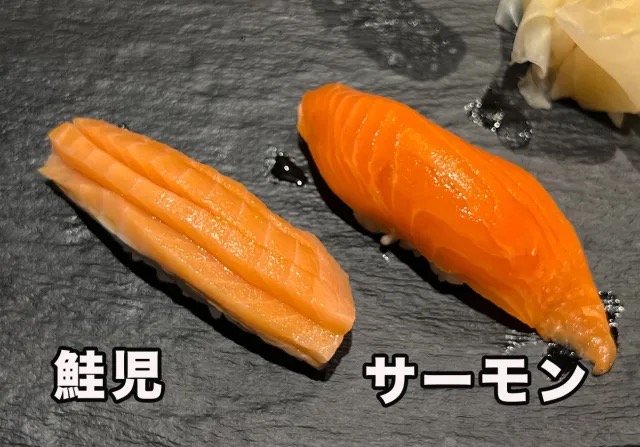
The difference in hues was similar to raw tuna, with the regular salmon being darkest, like lean tuna, and the two others being lighter, like toro (tuna belly). Yuuichiro wondered if the hues were an indication of depth of flavour, but there was only one way to find out.
▼ Left to right: Keiji, Tokishirazu, Salmon.

He started with the Tokishirazu, which literally translates to “unaware of time”, and refers to Chum salmon caught outside of the seasons, between spring and summer. The first thing he noticed about it was that it was much lighter than he’d expected, with a chewiness that took him by surprise as it was totally different to fatty tuna belly.
▼ It might look fatty, but Tokishirazu has a delicious depth of flavour.
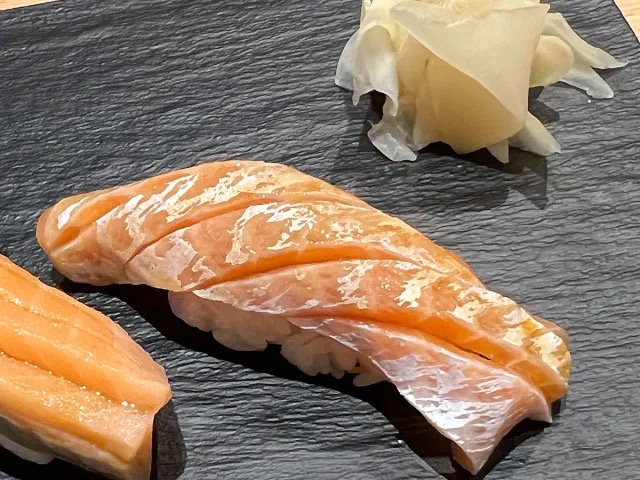
Moving on to the regular salmon, Yuuichiro was impressed by its delicious flavour and soft texture. It was so soft that the only thing he could imagine being softer in texture was cotton candy, so this was obviously very high quality.
▼ Another excellent piece of sushi.
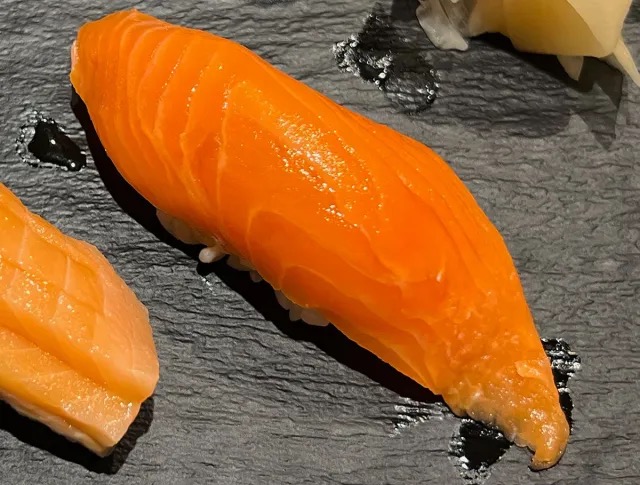
Now, it was time to move on to the super rare star of the show, the Keiji, which is known for its softness, although Yuuichiro couldn’t imagine it being any softer than the regular salmon he’d just eaten.
▼ So…how did this expensive fish taste?
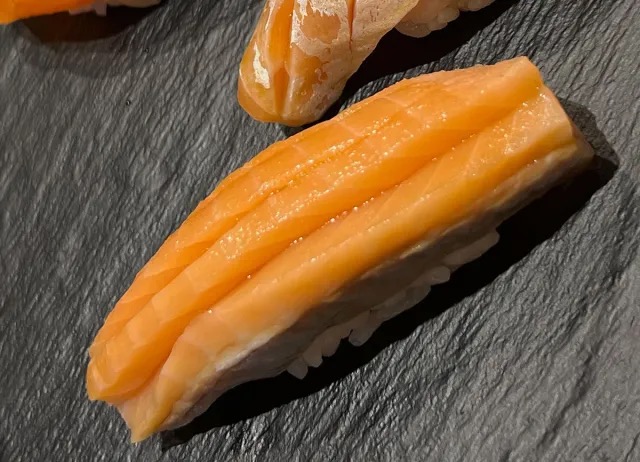
Well, it was soft in texture, but on a different level, displaying a mouthfeel that was almost airy. But there was a chewiness in there too. It was pretty impressive that it could be so soft with such a moderate amount of fat, and it was noticeably less oily as well. It had a good balance of softness and creaminess that was really quite spectacular.
However, was it better than regular salmon? Well, that was a question Yuuichiro found hard to answer. It was like a different type of salmon, but in addition to being light in texture, it was light in flavour too. He wasn’t able to definitively say which one was better, so he wondered if he should try another one to help him come to a decision.
▼ However, when he opened the touch panel, the Keiji had already sold out.
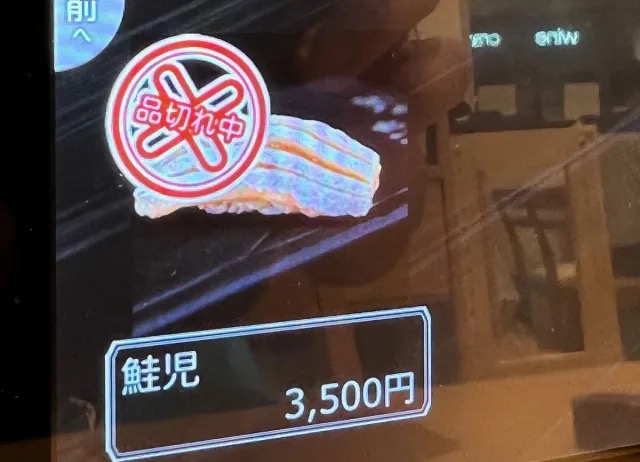
It looked like Yuuichiro had just ordered the last one in stock, making him realise how fortunate he was to have tasted it at all. However, with stocks of the rare fish now gone, Yuuichiro still doesn’t know whether to declare it better than regular salmon.
So in the end, he figured the answer to that would probably be up to personal taste. If you prefer a good punch of flavour, you’ll probably want to go with the regular salmon. However, if your tastes run towards the more refined end of things, where lightness and subtlety reigns supreme, you’ll probably enjoy the lighter Keiji.
As for Yuuichiro, he’d happily have both of them again any day of the week. As for raw fugu pufferfish semen, though, well, that’s another story.
Restaurant information
57 Tokyo / 札幌魚河岸 五十七番寿し
Address: Tokyo-to, Chiyoda-ku, Marunouchi 1-9-1, outside JR Tokyo Station Yaesu North Exit ticket gates, Gransta Yaekita Kurobei Yokocho B1F
東京都千代田区丸の内1-9-1 JR東京駅八重洲北口改札外 グランスタ八重北 黒塀横丁B1F
Open: 11 a.m.-11 p.m.
Website
Photos ©SoraNews24
● Want to hear about SoraNews24’s latest articles as soon as they’re published? Follow us on Facebook and Twitter!
Credit:

0 comments:
Post a Comment